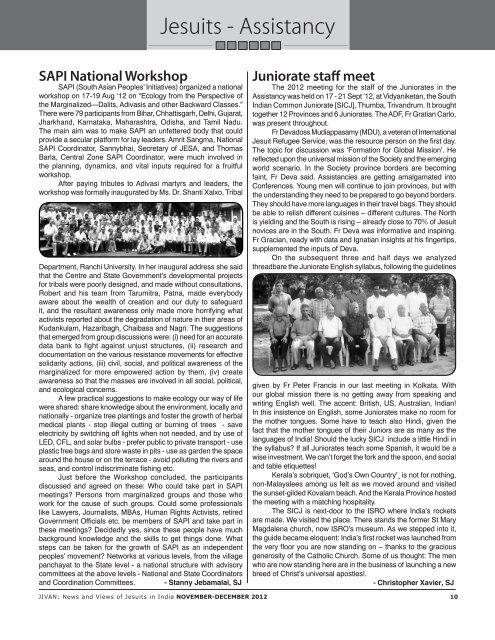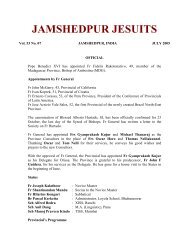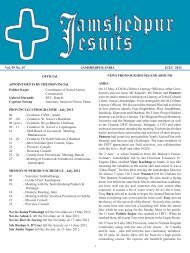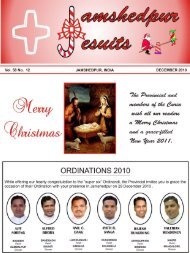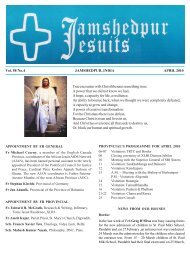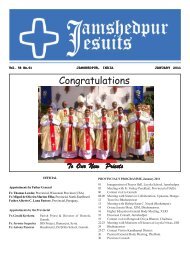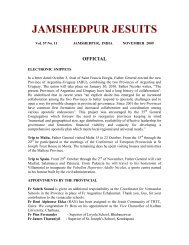Click here to download - Jamshedpur Jesuits
Click here to download - Jamshedpur Jesuits
Click here to download - Jamshedpur Jesuits
Create successful ePaper yourself
Turn your PDF publications into a flip-book with our unique Google optimized e-Paper software.
<strong>Jesuits</strong> - Assistancy<br />
SAPI National Workshop<br />
SAPI (South Asian Peoples’ Initiatives) organized a national<br />
workshop on 17-19 Aug ‘12 on “Ecology from the Perspective of<br />
the Marginalized—Dalits, Adivasis and other Backward Classes.”<br />
T<strong>here</strong> were 79 participants from Bihar, Chhattisgarh, Delhi, Gujarat,<br />
Jharkhand, Karnataka, Maharashtra, Odisha, and Tamil Nadu.<br />
The main aim was <strong>to</strong> make SAPI an unfettered body that could<br />
provide a secular platform for lay leaders. Amrit Sangma, National<br />
SAPI Coordina<strong>to</strong>r, Sannybhai, Secretary of JESA, and Thomas<br />
Barla, Central Zone SAPI Coordina<strong>to</strong>r, were much involved in<br />
the planning, dynamics, and vital inputs required for a fruitful<br />
workshop.<br />
After paying tributes <strong>to</strong> Adivasi martyrs and leaders, the<br />
workshop was formally inaugurated by Ms. Dr. Shanti Xalxo, Tribal<br />
Department, Ranchi University. In her inaugural address she said<br />
that the Centre and State Government’s developmental projects<br />
for tribals were poorly designed, and made without consultations.<br />
Robert and his team from Tarumitra, Patna, made everybody<br />
aware about the wealth of creation and our duty <strong>to</strong> safeguard<br />
it, and the resultant awareness only made more horrifying what<br />
activists reported about the degradation of nature in their areas of<br />
Kudankulam, Hazaribagh, Chaibasa and Nagri. The suggestions<br />
that emerged from group discussions were: (i) need for an accurate<br />
data bank <strong>to</strong> fight against unjust structures, (ii) research and<br />
documentation on the various resistance movements for effective<br />
solidarity actions, (iii) civil, social, and political awareness of the<br />
marginalized for more empowered action by them, (iv) create<br />
awareness so that the masses are involved in all social, political,<br />
and ecological concerns.<br />
A few practical suggestions <strong>to</strong> make ecology our way of life<br />
were shared: share knowledge about the environment, locally and<br />
nationally - organize tree plantings and foster the growth of herbal<br />
medical plants - s<strong>to</strong>p illegal cutting or burning of trees - save<br />
electricity by switching off lights when not needed, and by use of<br />
LED, CFL, and solar bulbs - prefer public <strong>to</strong> private transport - use<br />
plastic free bags and s<strong>to</strong>re waste in pits - use as garden the space<br />
around the house or on the terrace - avoid polluting the rivers and<br />
seas, and control indiscriminate fishing etc.<br />
Just before the Workshop concluded, the participants<br />
discussed and agreed on these: Who could take part in SAPI<br />
meetings? Persons from marginalized groups and those who<br />
work for the cause of such groups. Could some professionals<br />
like Lawyers, Journalists, MBAs, Human Rights Activists, retired<br />
Government Officials etc. be members of SAPI and take part in<br />
these meetings? Decidedly yes, since these people have much<br />
background knowledge and the skills <strong>to</strong> get things done. What<br />
steps can be taken for the growth of SAPI as an independent<br />
peoples’ movement? Networks at various levels, from the village<br />
panchayat <strong>to</strong> the State level - a national structure with advisory<br />
committees at the above levels - National and State Coordina<strong>to</strong>rs<br />
and Coordination Committees. - Stanny Jebamalai, SJ<br />
Juniorate staff meet<br />
The 2012 meeting for the staff of the Juniorates in the<br />
Assistancy was held on 17 - 21 Sept ‘12, at Vidyaniketan, the South<br />
Indian Common Juniorate [SICJ], Thumba, Trivandrum. It brought<br />
<strong>to</strong>gether 12 Provinces and 6 Juniorates. The ADF, Fr Gratian Carlo,<br />
was present throughout.<br />
Fr Devadoss Mudiappasamy (MDU), a veteran of International<br />
Jesuit Refugee Service, was the resource person on the first day.<br />
The <strong>to</strong>pic for discussion was ‘Formation for Global Mission’. He<br />
reflected upon the universal mission of the Society and the emerging<br />
world scenario. In the Society province borders are becoming<br />
faint, Fr Deva said. Assistancies are getting amalgamated in<strong>to</strong><br />
Conferences. Young men will continue <strong>to</strong> join provinces, but with<br />
the understanding they need <strong>to</strong> be prepared <strong>to</strong> go beyond borders.<br />
They should have more languages in their travel bags. They should<br />
be able <strong>to</strong> relish different cuisines – different cultures. The North<br />
is yielding and the South is rising – already close <strong>to</strong> 70% of Jesuit<br />
novices are in the South. Fr Deva was informative and inspiring.<br />
Fr Gracian, ready with data and Ignatian insights at his fingertips,<br />
supplemented the inputs of Deva.<br />
On the subsequent three and half days we analyzed<br />
threadbare the Juniorate English syllabus, following the guidelines<br />
given by Fr Peter Francis in our last meeting in Kolkata. With<br />
our global mission t<strong>here</strong> is no getting away from speaking and<br />
writing English well. The accent: British, US, Australian, Indian!<br />
In this insistence on English, some Juniorates make no room for<br />
the mother <strong>to</strong>ngues. Some have <strong>to</strong> teach also Hindi, given the<br />
fact that the mother <strong>to</strong>ngues of their Juniors are as many as the<br />
languages of India! Should the lucky SICJ include a little Hindi in<br />
the syllabus? If all Juniorates teach some Spanish, it would be a<br />
wise investment. We can’t forget the fork and the spoon, and social<br />
and table etiquettes!<br />
Kerala’s sobriquet, ‘God’s Own Country’¸ is not for nothing,<br />
non-Malayalees among us felt as we moved around and visited<br />
the sunset-gilded Kovalam beach. And the Kerala Province hosted<br />
the meeting with a matching hospitality.<br />
The SICJ is next-door <strong>to</strong> the ISRO w<strong>here</strong> India’s rockets<br />
are made. We visited the place. T<strong>here</strong> stands the former St Mary<br />
Magdalena church, now ISRO’s museum. As we stepped in<strong>to</strong> it,<br />
the guide became eloquent: India’s first rocket was launched from<br />
the very floor you are now standing on – thanks <strong>to</strong> the gracious<br />
generosity of the Catholic Church. Some of us thought: The men<br />
who are now standing <strong>here</strong> are in the business of launching a new<br />
breed of Christ’s universal apostles!.<br />
- Chris<strong>to</strong>pher Xavier, SJ<br />
JIVAN: News and Views of <strong>Jesuits</strong> in India NOVEMBER-DECEMBER 2012 10


